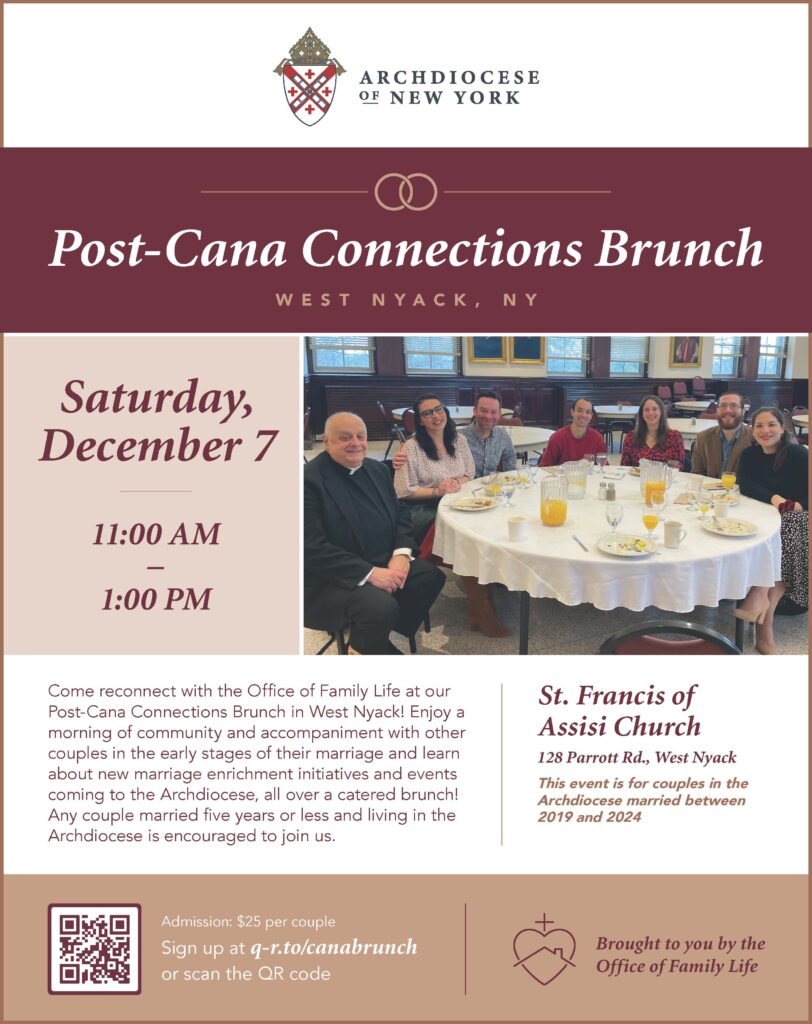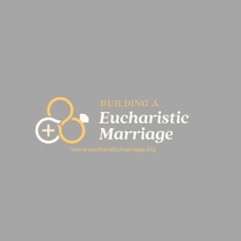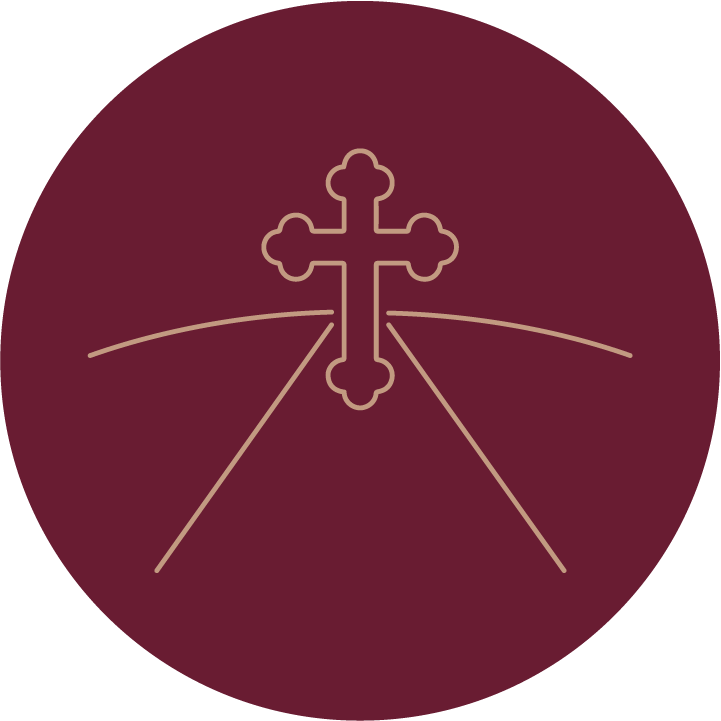
Prayer and Relationship with Christ
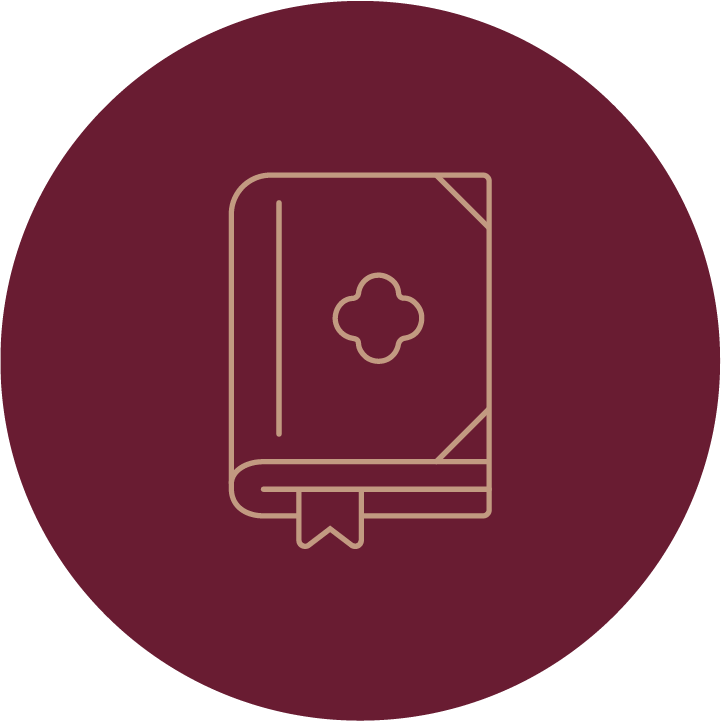
Formation
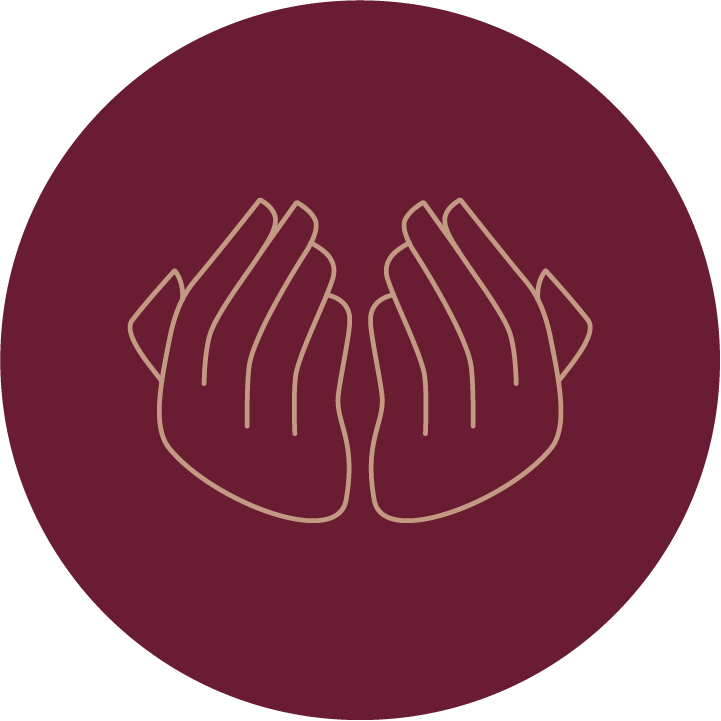
Accompaniment
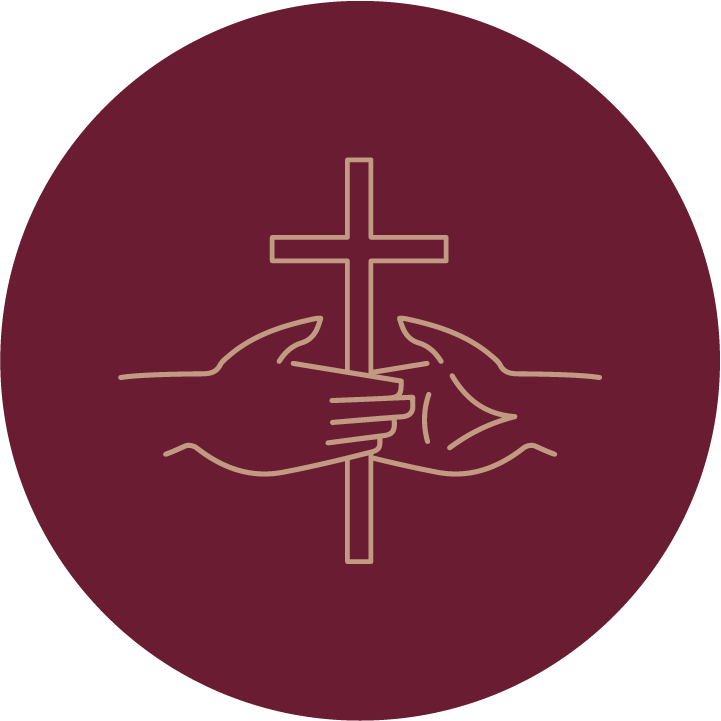
Advocacy
“Among the many blessings that God has showered upon us in Christ is the blessing of marriage, a gift bestowed by the Creator from the creation of the human race… It is a source of blessing to the couple, to their families, and to society and includes the wondrous gift of co-creating human life.”
– U.S. Catholic Bishops, 2009 Pastoral Letter: Marriage: Love and Life in the Divine Plan
Select a topic to be taken to that section of the webpage:
Marriage Preparation Program Options
Marriage Preparation FAQs
Marriage Enrichment Offerings
Building a Eucharistic Marriage
Convalidation/Re-Marriage
Natural Family Planning
Clergy Portal
ARCHDIOCESE OF NEW YORK MARRIAGE CATECHUMENATE MARRIAGE PREPARATION PROGRAM OPTIONS
Congratulations on your decision to get married in the Catholic Church! We are excited to join you on this journey of faith and love.
The Archdiocesan Marriage Catechumenate offers a comprehensive program consisting of various components to prepare you for marriage. These include an online relationship inventory, online learning modules, and a Pre-Cana session, which can be attended in person or online using a hybrid model.
Marriage preparation is not limited to a single day; it is a process that allows you to explore the meaning and purpose of a Catholic marriage. It helps you discover how you can encounter God’s love and life-giving presence in new and special ways. Throughout this process, your priest, deacon, family, friends, and the parish community will provide support. There’s no need to worry or feel anxious. We are all here to assist.
The Pre-Cana portion of the Marriage Catechumenate is well-structured, offering several options for completion:
You have two choices: an in-person full-day Saturday session, or an on-demand session available for you to work on at your own pace and concluding with a Saturday one hour Zoom session. Available in English or Spanish.
Pre-Cana Marriage Preparation to help you and your fiancé prepare for your life together as husband and wife. Our in-person retreat is an alternative program that fulfills the Pre-Cana requirements of the Archdiocese of New York and other Dioceses. Catholic Engaged Encounter of Lower Hudson Valley has been supporting engaged couples for over 45 years. “A Wedding is a Day, A Marriage is a Lifetime®”
Your parish may offer a local Pre-Cana program. In this case, you may follow the guidelines provided by the parish.
Once you have chosen one of these options, regardless of your choice, here is how you can proceed:
- Begin by praying about your vocation to a Catholic marriage.
- Meet with your local parish priest or deacon (even if you plan to marry elsewhere) to discuss the wedding date, time, location, and other details.
- Complete any forms requested by the priest or deacon.
- Decide on your option:
- For the Archdiocese of New York Marriage Preparation Program option above, visit the Pre-Cana website at archnyfamilylife.org and complete the registration process including Pre-Cana fee payment. Regardless of the Pre-Cana option you choose, online registration on the Archdiocesan Marriage Preparation Portal is expected.
- For the Catholic Engaged Encounter, Download the brochure. Learn more at lowerhudsonvalley.engagedencounter.com. Regardless of the Pre-Cana option you choose, online registration on the Archdiocesan Marriage Preparation Portal at archnyfamilylife.org is expected.
- For the Parish Sponsored/Approved Pre-Cana Session, your parish may offer a local Pre-Cana program. In this case, you may follow the guidelines provided by the parish and also register online at archnyfamilylife.org and complete the appropriate form.
- Before attending the Archdiocese of New York Pre-Cana session (option #1 above), and after consulting with your priest or deacon:
- Complete one of the marriage inventories: Catholic Couple Check-up or Prepare/Enrich (links provided once you have registered).
- Finish the Online Learning Modules (links provided once you have registered).
- It is highly recommended that both individuals participate in a Fertility Awareness Course either in-person or online.
- Attend the Archdiocesan approved Pre-Cana Session, either in-person, on-demand, at an approved parish, or a weekend retreat.
- Print your Certificate of Completion and present it to your priest or deacon.
- Schedule follow-up meetings with your priest or deacon to fulfill any remaining requirements.
- Enjoy your wedding day!
- Stay connected after your wedding by visiting the Archdiocese of New York Office of Family Life website for information and opportunities for married couples.
Important Information
If you plan to marry outside the Archdiocese, you must still meet with your local parish priest to ensure
any necessary permissions or dispensations are obtained.
Additionally, the proper documents must be sent to the diocese where you will be married.
For more information, contact Canonical Services at 646-794-2935.
Would you like to view these options offline? Click the download below to view the above information in a brochure.
Marriage Prep FAQs
For questions on marriage preparation, choose from the frequently asked questions below.
Because of marriages’ importance, the archdiocese requires and regulates an intentional marriage preparation process. Our goal is to help you to grow in love and be open to God’s graces in preparation toa happy and fulfilling marriage. There are several components to this:
- To determine whether you have the basic elements of a psychological, intellectual, moral and legal capability for marriage and family life
- To foster a clear awareness of the essential characteristics of Catholic marriage: unity, fidelity, indissolubility, and fruitfulness
- To offer an opportunity for deepening your personal faith and to help you discover of the value of the sacraments and the experience of prayer
- To offer practical advice and assistance on married love, including marital communication and overcoming challenges
- To provide education and support on Catholic values concerning human life and married sexuality, in keeping with the authentic teachings of the Church.
According to the Canon Law (the law of the Church), for a marriage to be valid:
- At least one of the spouses must be a baptized Catholic (Confirmation is not required, but recommended. Reach out to your officiant if you are interested in RCIA.)
- The wedding must be celebrated in Catholic church in the presence of a Catholic priest/deacon/bishop and two other witnesses
- The spouses must be free to be married (e.g., no prior valid marriages)
- They must be psychologically mature and capable of consenting to the marriage
- They must understand the nature of Catholic marriage (i.e., exclusive, permanent, and open to having children)
A marriage that doesn’t follow the Canon Law requirements (e.g., a civil marriage) is not valid in the eyes of the Church. If you are civilly married, and would like to be married in the church you can! Find more information about convalidation here.
Under the regulations of the archdiocese, the spouses must also meet several times with the priest/deacon who will be witnessing their marriage, and they must attend a marriage preparation program. Find out more here.
Marriage is a sacred covenant between a man, a woman and God. It is a tremendous gift and a visible sign of God’s love and commitment to His people (Eph 5:31-32). This sacred relationship is the foundation of the family and society and the life of the Church. This public act is celebrated as part of the Church’s liturgy and introduces couples into a new and special stage of life in the Church. It creates a permanent and faithful bond between husband and wife and establishes significant rights and responsibilities between a couple and, eventually, their children.
Because marriage is so important, the Church wants to make sure couples are properly prepared and fully aware of what is involved. . The Church’s special obligation to take care of the spiritual health of all of God’s people informs this robust and intentional preparation process.
As a result, marriage preparation is regulated and overseen by Canon Law (the Church’s universal law), the archdiocese, liturgical rules and pastoral requirements of individual parishes and priests.
Our goal is for couples to enter this process with an earnest and open heart and face issues and answer difficult questions of critical importance in advance of their marriage. These conversations, often with priest/deacon, are intended to open lines of communication and hopefully avoid problems in the future ultimately resulting in a firmer sense of confidence in their love and in the love of God.
If you’re Catholic, you’ll need to have the following documents:
- A certificate of baptism, dated within six months of your wedding date
- Evidence of your first communion and confirmation if applicable
- If you’re not getting married in your home parish, your freedom to marry must be established by either a statement of “no notations” (prior valid marriages, religious vows, etc.) on your baptismal certificate (e.g., that there are no prior valid marriages, no religious vows, etc.) or a letter from your pastor
If you’re a non-Catholic Christian, you will need evidence that you were baptized (e.g., a recent baptismal certificate). Some priests/deacons will ask for a letter from a parent or other adult stating that you are free to be married (no prior marriages).
You will usually be asked to have these documents at the time of the Pre-Marital Interview (PMI). See question 13 for more information.
A marriage between a Catholic and a non-Catholic, can still be a sacramental marriage. The preparation process for the marriage remains the same except the Catholic spouse must obtain a formal permission from his/her bishop for the marriage. This is formally called “dispensation” due to “disparity of worship”.
The priest or deacon overseeing your marriage preparation will help you obtain any documents you may need. If your home parish is not within the Archdiocese, please contact them to obtain these documents.
The processing and approval of these dispensations take time, so you should start the process early (at least 6 months before the wedding is recommended.)
Please see the answer to the following question if you are curious about getting married outside of a church.
You should also be aware that there can only be one marriage ceremony. If the wedding is celebrated in the Catholic church, the priest presides, and a non-Catholic minister can offer prayers and ask a blessing on the couple. If the wedding takes place in a non-Catholic church, the minister presides, and a priest/deacon may be present to offer a prayer and blessing.
The Catholic spouse is also under serious obligation to ensure their children are raised in the Catholic faith — indeed, during one of your interviews with the priest/deacon who is overseeing your marriage preparation, the Catholic spouse must make a formal promise to that effect, and the other spouse must be made aware of that promise.
It is crucial to have open and honest communication about differences in faith and what that may mean for your future lifestyles. The robust marriage preparation process should start those conversations and help mitigate and avoid potential problems that they may cause. There are many wonderful and strong interfaith relationships in which the couples, based on their love and mutual respect, grow closer to God and each other; this is what we wish for you. Holiness is the goal, and a married couple with religious differences can still get there — and be joyfully married as well — by helping and supporting each other.
The answer to the question depends on whether a marriage is between two Catholics, between a Catholic and another Christian or between a Catholic and a non-Christian.
Marriage Outside of a Church — Between Two Catholics
Under Canon Law, a marriage between two Catholics must be celebrated in a parish church. The only exception is for a marriage in a Catholic chapel if one of the spouses is a student, graduate, faculty member, or has some other significant connection to the institution. Permission must be requested from the local pastor. Your priest/deacon will help you obtain permission.
Under the regulations of the Archdiocese of New York, permission is never granted for a marriage between two Catholics to be celebrated in such places as parks, restaurants, catering halls, hotels, cruise ships, or the beach.
Marriage Outside of a Church — Interfaith Situations
Out of respect for other faith communities, permission can be obtained for a wedding to celebrated at another house of worship. The Catholic spouse must obtain a “dispensation from canonical form” (a release from the formal requirements that the wedding occur in a Catholic Church, witnessed by a Catholic priest, deacon or bishop) from his/her bishop. Your priest/deacon will help you to obtain this dispensation from the Chancery Office. Obtaining the dispensation can take time, so you should start the process early.
Permission can only be granted for a wedding between a Catholic and another Christian outdoors or in a non-religious location only if the circumstances merit special permission, reserved to the judgment of the Chancery. However, permission may be given for a wedding between a Catholic and a non-Christian in a non-religious building if there are truly extraordinary circumstances.
Because the Catholic Church recognizes marriage as a permanent and sacred bond between a man and woman “until death,” a person cannot enter into a second marriage while his or her previous spouse is still living.
Yet, certain personal and spiritual elements required for a valid marriage may have been missing before the previous wedding ceremony took place. After an annulment investigation, the Church may conclude with moral certitude that no valid marriage had taken place, and the parties are free to marry someone else.
The Annulment process can bring tremendous self-healing to individual whose marriage ended in divorce. It is best to contact your parish priest to begin the annulment petition process, and he will direct you to next steps. For additional information on annulments, visit this article. In the Archdiocese of New York, you can also visit our website here, or contact us via email [email protected] or call 646-794-3200 for more information.
If you’re getting married outside of the Archdiocese of New York you should speak to the priest or deacon who will be witnessing your marriage about your marriage preparation. Often, they will be satisfied if you attend a marriage preparation program here. They also may ask you to work with a priest or deacon here regarding your marriage preparation (e.g. he may ask that a priest in your local parish do a Pre-Marital Interview). See question 13 for more information.
The spouse who is a native of the archdiocese will have to make sure certain documents are sent to the priest or deacon who will be officiating the marriage. Your local priest will send the necessary documents to the other diocese after having the Chancery Office endorse them with the archdiocesan seal.
Any dispensations or permissions required by Canon Law must be granted by the bishop of your home diocese.
For various reasons, a couple may have chosen to marry civilly instead of getting married in the Catholic Church. No matter the circumstances, we eagerly invite you to bring your marriage into the Catholic Church! The process to do this is called convalidation.
Even if there is not explicitly wrong with or negative about your family life and marriage dynamic, there is a tremendous beauty and strength in a Catholic and sacramental marriage that we encourage you to explore. As spouses, you can enter into a deeper and more grace-filled relationship with each other and with God by having your marriage convalidated by the Church.
Convalidation is a relatively simple process, particularly if neither of the spouses was in a prior marriage before joining their current partner. If one or both of the spouses was in a prior marriage, the partner in the earlier union must have died, or the Church must have issued a declaration of nullity (commonly called an annulment) before the convalidation process can begin.
In either case, the first step is to contact a local parish or your own parish, and make an appointment to thoroughly discuss your situation with the pastor or his delegate and determine the steps to follow.
Despite common misconceptions, the Church does not promote or permit couples to move in together before they are married. This is not without good reason, though. Studies show very clearly that living together is not good marriage preparation, but instead hurts relationships:
- The divorce rate for couples who have lived together is much higher than for other couples (some studies report that couples who lived together before marriage are twice as likely to divorce within the first ten years of marriage).
- In the case of men who have lived with a series of women, the divorce rate is even higher.
- The longer the couple lives together, the higher the divorce rate.
- Couples who cohabit typically have worse communication and conflict resolution skills than those who do not, and a reduced sense of commitment.
Because of the moral and spiritual problems, speak honestly and openly to your priest/deacon about the situation. Go to confession, and seek God’s forgiveness and healing.
Take a serious look at your motivations and expectations about marriage considering the current state of your relationship. Ask yourself: Am I really ready for a life-long, exclusive commitment? Am I feeling pressured to get married because of my current situation?
The best thing is to move into separate living quarters and be chaste until your wedding night. If that’s not possible because of financial concerns, you can still agree to be chaste until marriage.
The question of prenuptial agreements frequently arises today. These agreements are basically a contract between prospective spouses about how their property and other rights will be handled within their marriage and how they would be handled in the event of a divorce.
The Catholic Church does not have a blanket prohibition against prenuptial agreements. There may be some cases where they are perfectly legitimate. For example, if a widow with adult children marries a widower who also has adult children, a prenuptial agreement can be a legitimate way to preserve the inheritance rights of each spouse’s children to the property of the prior marriage.
In most cases, however, prenuptial agreements are a bad idea, and may even call into doubt the validity of the marriage.
When a couple enters into a prenuptial agreement, they implicitly foresee the break-up of their marriage, It suggests their consent is to be married until it doesn’t “work out,” and that they are more committed to their possessions than to the marriage. This is not compatible with Catholic marriage. . For a marriage to be valid, the couple must both fully understand what indissolubility means and they consent to it.
Our advice is that couples should avoid prenuptial agreements. We would also recommend that couples talk seriously about why they would contemplate a prenuptial agreement and whether they are truly ready to make the commitment to a full, permanent marriage.
Yes. It is your responsibility to obtain and present a valid marriage license to the priest/deacon who is presiding at your wedding before the marriage ceremony. For more information about the current requirements for a marriage license, visit the website of the New York State Department of Health.
This is the meeting at which the priest/deacon will make sure all Canon Law requirements have been met. This brief process is another way we ensure open lines of communication and speak to the priest/deacon about anything on your mind.
Many people desire a blessing from the Holy Father in anticipation of their wedding and marriage. For information about how to obtain this blessing, click here.
Contact your officiant for a personalized selection of readings and music selections. You can find popular reading selections on this site. Find Archdiocesan guidelines for the music here.
Marriage preparation is not limited only to the required courses. We should never want to stop learning how to love each other better.
There are many opportunities for marriage enrichment, through various programs like the one-day Celebrate Marriage Day or a Marriage Encounter Weekend retreat.
Don’t forget that the family that prays together, stays together.
There are lots of ways to grow together spiritually, such as praying together as a couple and celebrating the liturgy together. For other opportunities and programs see the Family Life Office Marriage Enrichment webpage.
Mentoring engaged couples and lending a helping hand in the marriage preparation process will also help you grow closer by sharing your lives with engaged couples. After you have been married for a while, call us at 646-794-3188 or email us at [email protected] and find out how you can help.
MARRIAGE ENRICHMENT OFFERINGS
For Your Marriage helps couples at all stages of life to understand and live God’s plan for happy, holy marriages by providing educational and spiritual resources.
– For Your Marriage
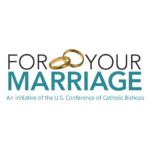
For Your Marriage is a resource provided by the USCCB to help you and your spouse deepen your connection to each other and your faith as part of the National Pastoral Initiative for Marriage. Whether you are looking for advice and information on dating, your wedding day, married life, parenting, caregiving, or consolation, there is support from real couples like you and experts from professions and the Church alike at foryourmarriage.org.
Visit their website for blogs, columns, resources, and more. Follow them on Facebook, Twitter, or Pinterest.
Post-Cana Connections Brunch
Come reconnect with the Office of Family Life at our Post-Cana Connections Brunch in West Nyack! Enjoy a morning of community and accompaniment with other couples in the early stages of their marriage and learn about new marriage enrichment initiatives and events coming to the Archdiocese, all over a catered brunch! Any couple married five years or less and living in the Archdiocese is encouraged to join us.
Saturday, December 7
11 AM – 1 PM
St. Francis of Assisi Church
128 Parrott Road, West Nyack
Admission $25 per couple
Worldwide Marriage Encounter
Start the new year right! Do something life changing, live your best life in love. Apply by December 1, 2024!
Tuesday, January 7, 2025
Tuesday, January 14, 2025
Tuesday, January 21, 2025
Tuesday, January 28, 2025
Tuesday, February 4, 2025
Tuesday, February 11, 2025
Tuesday, February 18, 2025
Evenings
Building a Eucharistic Marriage
Building a Eucharistic Marriage is a 7-part online video series that connects 7 areas for therapeutically strengthening your marriage with 7 areas of deepening your relationship with Christ through the Eucharist.
There are options for couples who want to purchase an individual copy for home use or for parishes who would like to purchase a license for running the video series at their parish. The Parish License comes with a leaders’ guide, unlimited participant guides, as well as advertising options and participant discounts on their own copy of the program.
To learn more, go to: www.eucharisticmarriage.org.
CONVALIDATION/RE-MARRIAGE
“A convalidation is not simply a renewal of the previous intention to marry, but the creation of a valid marriage in the sight of the Christian community.” – USCCB
If you desire to have your civil marriage blessed by the Church, convalidation is the process you need to follow.
- Pray for your decision to have your marriage convalidated.
- Meet with your local parish priest or deacon (even if you plan to marry elsewhere) to discuss the best option for your convalidation.
- For information and to register, click here.
- Choose one of the following options that are required by the Archdiocese of New York:
- Parish convalidation process
- ALPHA Marriage Enrichment course
- Archdiocese of New York Pre-Cana Day
- Choose one of the following options that are required by the Archdiocese of New York:
- Meet with your priest or deacon, who will continue to accompany you.
- In addition to regular worship in your parish, consider joining one of the parish ministries using the gifts and talents given by God to serve the community.
- Enjoy your convalidation ceremony.
- Continue to worship regularly in your parish and participate in parish ministries that will enhance your marriage.
- Click here for marriage enrichment and evangelization opportunities.
New Life Remarriage
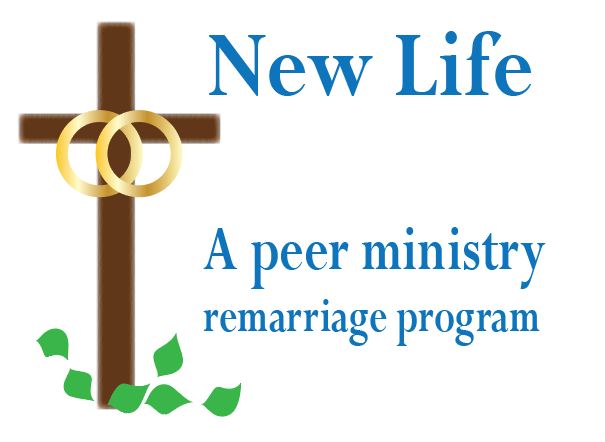
New Life is a peer ministry program that ministers to the unique needs of remarrying couples, which are much different than first time couples, by providing a new model for biblical marriage and preventing redivorce. The specific issues that couples face in remarriage are significant and need to be addressed in programs unique to their needs. Remarried couples share their experiences about the dynamics of remarriage including blending families and gaining insights into themselves and their relationship. They connect with couples, in the spirit of fellowship and support experiential activities to rebuild and rediscover new relationships. To that point, topics common to all couples, such as conflict resolution and finances, take on a new perspective through the lens of remarriage. The principles covered in the program are universal in nature for any Christian denomination and based on current, evidenced-based research on remarriage. New Life satisfies (re) marriage prep requirements when working with a pastor or deacon.
New Life Programs / Registration Deadlines
February 21-22, 2025 [Deadline to register is February 7th 4:30pm CST]
July 18-19, 2025 [Deadline to register is July 2nd 4:30pm CST]
NATURAL FAMILY pLANNING
Natural Family Planning (or NFP) is the general title for those methods of family planning that teach couples how to understand and cooperate with their fertility to attempt and/or space pregnancies. When a married couple discerns to attempt pregnancy, spouses use the fertile time of the wife’s cycle for conjugal relations. And when they discern it is time to postpone or avoid pregnancy, husband and wife simply abstain from conjugal relations during the wife’s fertile time. No drugs or devices are used to harm God’s design.
Marriage Preparation Natural Family Planning and Theology of the Body Course for Engaged Couples
A complete overview of the Creighton Model FertilityCare System founded by Dr. Thomas Hilgers, MD and an introduction to St. Pope John Paul II’s Theology of the Body.
Presented by Kelly Vardakas, MA, FCP
Sessions are held monthly via Zoom
Sign up for the next course here.
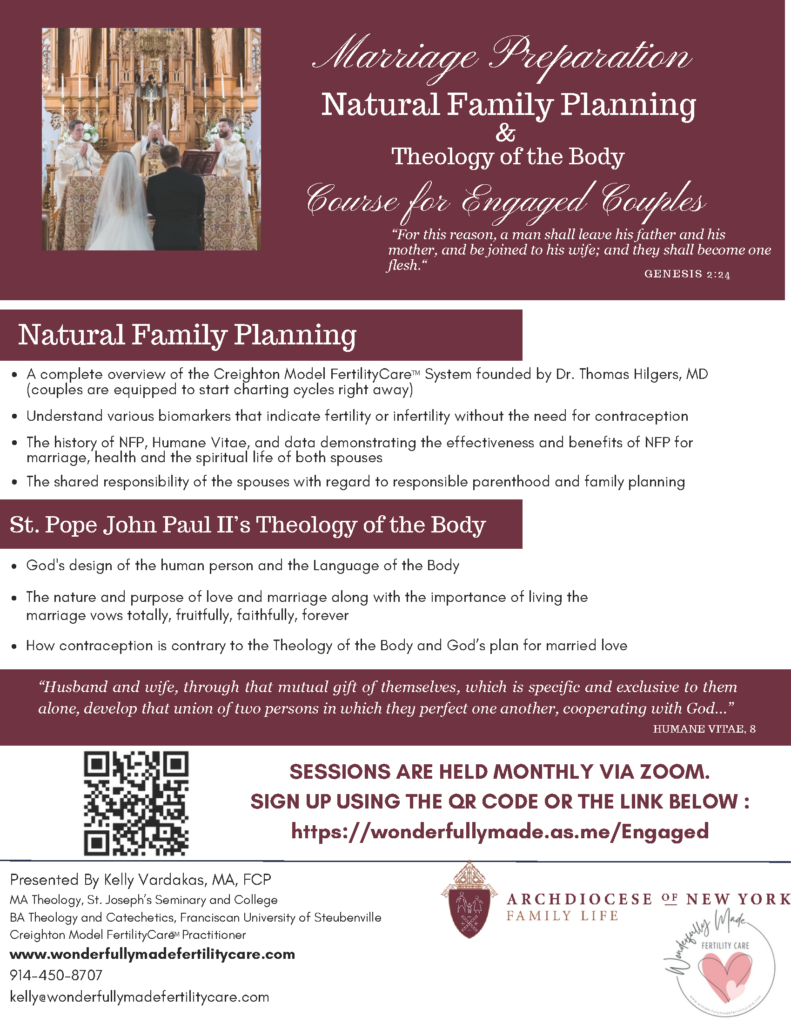
This is one of the most misunderstood issues in the Catholic Church. God designed marriage to be the place where human sexuality reaches its fullness—where the “one flesh union” of husband and wife can blossom and where new life can be created and nurtured. God also created a beautiful and practical biological system by which a woman’s body tells her (and her husband) everything she needs to know about her fertility so that they can embrace God’s design as they strive to include Him in their spousal love.
This is why it is so important to learn about the natural science that enables couples to reap the benefits of God’s plan for love and life. Learning about your combined fertility allows couples to tap into those benefits, which are great, both in this world and throughout eternity!
Many of the foundational NFP methods were developed by Catholic scientists back in the late-20th century. In the 21st century, developments in fem-technology (e.g., fertility monitors, menstrual charting apps, etc.) have had a positive impact on the classic NFP methods. In addition, new NFP providers and organizations have emerged. They have joined the established NFP community to advance education, research, and innovation in the NFP methods and ethical women’s healthcare.
God created us to live with sexual integrity, because he loves us and desires our happiness. To do this, we need to learn and understand what God’s plan is, as well as strive to embrace and live it. God intended that the act of conjugal relations (“sex”) means “a total gift of self”—husband gives himself without reservation to his wife and she, in turn, gives herself totally to him. Understanding how human fertility is part of this gift of self, helps husband and wife open their hearts to God’s plan for their marriage. This marital love is the foundation of the family.
If couples want to consider learning an NFP method, we strongly suggest the following:
- Take a formal NFP course from a certified teacher and complete the designated curriculum, either online or in person. This is key to successful use of an NFP method.
- Do your research! The practice of an NFP method will affect your lifestyle. Find out which NFP method is best suited for you and your spouse. Regarding the growing area of Sympto-Hormonal methods and fem-tech, please be aware that some apps, sensors, and monitors work better than others. In addition, individual NFP method providers will have their approved apps and fertility monitors that are exclusive to them. One app the Family Life office endorses is the FEMM app—it is designed to be used with that NFP method. Feel free to contact our NFP specialists for additional information.
- Understand the commitment to the daily practice you need to make. for NFP to be effective. It requires consistent use, mutual motivation, and loving cooperation.
- As a couple, understand your family planning intention (whether you are trying to attempt a pregnancy or avoid one). Know the NFP method’s effectiveness rates for both avoiding and achieving pregnancy. And consider your commitment to being open to new life—are you? Are you inviting the Lord God into your decision making? These factors will play a strong role in how well you will live your NFP lifestyle.
Talk to your spouse about NFP. Pray and make a faith-filled and Christ-centered decision, respecting God’s design for married love!
Frequently Asked Questions
Sometimes the more familiar term NFP is used along with, or in place of, the term FABM or Fertility Awareness.
NFP is the general term for the scientific, natural and moral methods of family planning that can help married couples either achieve or avoid pregnancy. It highlights that couples do not use artificial barriers (e.g., condoms) or chemicals (e.g., the birth control pill) to prevent pregnancy, and it intends that both spouses share responsibility for the decision of achieving or avoiding pregnancy. The couples accept fertility as a normal state of health and share responsibility for family planning by modifying behaviors according to their intentions.
In the strictest sense of the term, the FABM encompasses merely the scientific/biological aspect (that these methods are based on an understanding of one’s fertility). As such, the FABM can be used as a natural family planning method, but it can also be used for monitoring a woman’s reproductive health.
The difference is that an FABM doesn’t require both spouses to share responsibility for the decision of achieving or avoiding pregnancy (but many couples choose to share this responsibility.) While some couples who use FABMs also use condoms or other forms of contraception in addition to using an FABM, NFP excludes the use of artificial barriers (e.g., condoms) or chemicals (e.g., the birth control pill) because the use of these to suppress fertility violates God’s plan for married love.
Learn more about this in Married Love and the Gift of Life, here. En español.
More than ever – women are interested in understanding and tracking their cycles to monitor and manage their “overall” health. They are enabled by both apps and new medical technology, and one of the major forces of change is that the medical world is now identifying a woman’s fertility (ovulation & menstruation) as her 5th vital sign.
With the rapidly expanding landscape of fertility apps, monitors, and sensors, you may be questioning if these technologies are approved by the Catholic Church and if they are safe and effective. Some of these technologies can be of great assistance to couples in avoiding or achieving a pregnancy while still living out God’s plan for marital love. But the couple needs to learn about the science of fertility and do the required research.
If you use one of these apps or devices, the same Church teachings apply. When you detect that you are fertile, you either abstain from having sex (if you don’t want to get pregnant) or you engage in sex, open to the possibility that God will bless your union with new life.
God’s plan keeps Him this involved in your marital intimacy. Using any type of artificial barrier keeps God out of the equation, and this is what Church teaching disagrees with.
FEMTECH, or Female Technology, refers to the use of more advanced technologies in women’s health, such as using advanced learning algorithms and AI-based analysis, wearable sensors, and other new technologies. And while the FEMTECH industry is exploding with new opportunities for women, it continues to build on the original NFP foundations.
There are many new support groups emerging on Facebook and there are many faithful Catholic women and men managing their fertility according to God’s plan and sharing their stories via social media. Try searching Facebook for “Catholic and NFP.”
Finally, if couples want to consider any of the new technologies, we strongly suggest the following:
- Take a formal NFP or FABM course from a certified teacher and complete the designated curriculum, either online or in person. This is key to successful use of the technologies.
- Do your research! This is a growing and changing area that affects your lifestyle. Some apps, sensors and monitors work better than others, and most work with specific NFP methods. One app the Family Life office endorses is the FEMM app, but feel free to contact our NFP Specialists for additional information.
- Understand the commitment to daily practice you need to make. for NFP to be effective. It requires consistent use, mutual motivation and loving cooperation.
- Understand the risks and impacts of any of these methods failing. Can you always be open to the possibility of bringing new life into this world?
Talk to your spouse about NFP and fertility awareness, pray, and make a faith-filled and Christ-centered decision, respecting God’s design for married love.
NaPro TECHNOLOGY
Infertility presents couples with an unexpected cross. Marriage is inherently called to bring forth new life, and those couples unable to conceive suffer from this unfulfilled, natural human desire. There is hope. The Creighton Model FertilityCareTM System, used in conjunction with NaPro TECHNOLOGY – a medical approach cooperating with natural hormonal balance of the human body, can increase a couple’s potential to conceive a child.
Updated websites for the Manhattan and St. Peter’s Gianna Centers are listed below.
Gianna Centers – Healthcare for Women
The Gianna Centers provide comprehensive gynecologic primary care and specialized fertility and family planning techniques to uncover the causes of infertility for all women. Some Gianna Centers offer NaPro TECHNOLOGY, which is the natural alternative to assisted reproductive technologies such as in vitro fertilization. NaPro TECHNOLOGY is a Church-approved fertility treatment in accordance with the Ethical and Religious Directives for Catholic Health Care Services. Staff by friendly, licensed professionals, the Gianna Centers esteem woman’s healthcare and they remain deeply committed to honoring a woman’s dignity and the sanctity of human life.
Area Gianna Centers that offer initial consultations for infertility and recurrent miscarriage and provide NaPro TECHNOLOGY include the Centers listed below. For more information or to schedule an appointment at one of the Centers, visit their website:
Catholic Health Services of Long Island Centers:
- New York City Gianna Center in Manhattan
Website: www.chsli.org/gianna-center
- New York City Gianna Center in Manhattan
- Long Island Gianna Center in Babylon, NY
Website: www.chsli.org/gianna-center
- Long Island Gianna Center in Babylon, NY
- Rockville Centre Gianna Center
Website: www.chsli.org/gianna-center
- Rockville Centre Gianna Center
Saint Peter’s Gianna Center (Somerset, NJ) Website: https://sppanj.com/services/gianna-center/
MorningStar Family Health Center (Clinton, NJ) Website: www.morningstarfhc.com
Gianna Center of Albany Website: www.giannaofalbany.com
SPRINGS IN THE DESERT
Springs in the Desert is a Catholic apostolate founded by Kimberly Henkel, PhD and Ann Koshute, MTS. Their shared experience of infertility and the isolation it breeds led them to found this ministry to provide spiritual and emotional support and accompaniment to those carrying infertility’s heavy burden. For more information visit www.springsinthedesert.org.
Monthly Support Group at the Manhattan Gianna Center
The Manhattan Gianna Center for Women’s Catholic Healthcare (15 East 40th Street Ste. 101) offers a FREE monthly support group on the third Thursday of each month. These meetings allow women to discuss their feelings with other women who are also struggling with infertility. Reading material on infertility is provided and discussed. Any woman can attend; they do not need to be patients of the center nor Catholic. Please call (212) 481-1219 for more information. Some meetings are cancelled if turn out is low, so be sure to contact them ahead of time.
Additional Articles and Resources
- New Hope in Infertility by Dr. Anne Nolte, M.D.
- Embracing the Cross of Infertility by Dr. Marie Meaney
- Facing infertility: A journey of faith, hope and love by Mary Louise Kurey
- Dealing with Infertility: A Guide for Catholics by Julie Kelemen
- The Infertility Companion for Catholics by Angelique Ruhi-Lopez and Carmen Santamaria
- Infertility Journey by Jeannie & Bruce Hannemann
- Life-Giving Love in an Age of Technology: a statement published by the USCCB, November 17, 2009.
St. Gianna Mass
The St. Gianna Mass is a beautiful liturgy celebrated for couples who have or currently are struggling with infertility or recurrent miscarriage. Gathered in a solidarity of hope, couples are invited to experience the healing graces of the Eucharist, followed by fellowship and an opportunity to meet a healthcare professional from the Gianna Center for Women’s Healthcare.
NFP/FABM Educators are listed below according to the method taught to achieve or postpone pregnancy. Most offer classes, both online and in-person that cover the science and biology, how to use the method, the Church’s teaching, and basic charting.
While there are many effective NFP methods and instructors available, the three methods of NFP that the Archdiocese of New York supports include the Cervical Fluid methods, the Sympto-Hormonal methods, and the Sympto-Thermal methods listed below, along with the independent organizations who provide training in these methods.
Cervical Fluid Methods
The Billings Ovulation Method (BOM) is based on a woman’s daily observations of cervical fluid (also known as cervical mucus). For additional information on the BOM, visit: http://www.factsaboutfertility.org/wp-content/uploads/2017/12/BillingsPEH_REV3.pdf
For training options available, visit the following sites:
- learnnfponline.com by The Marriage Group, LLC
- boma-usa.org by BOMA-USA
- St. Augustine Foundation’s “Catholic Couples NFP” no-cost program. For more information, visit CCNFP.org or call 888-899-8884.
The Creighton Model FertilityCare System (CrMS) is a comprehensive method for tracking a woman’s fertility by teaching her to understand the cervical fluid or mucus observations throughout her cycle. The Creighton method also serves as a tool for evaluating and monitoring a woman’s reproductive and gynecologic health through the new science of Natural Procreative (NaPro) Technology. For additional information on the CrMS, visit: http://www.factsaboutfertility.org/wp-content/uploads/2014/09/CreightonPEH.pdf
For training options available, visit the following sites:
- Gianna Centers (Manhattan and Long Island): chsli.org/gianna-center
- St. Peter’s Gianna Center (Somerset, NJ): saintpetershcs.com/Services/Gianna-Center
- MorningStar Family Health Center (Clinton, NJ): morningstarfhc.com/
- Gianna Center of Albany: giannaofalbany.com/
- Creighton Fertility Care Services: lifertilitycareservices.com/class-descriptions
- FertilityCare Centers of America: fertilitycare.org
Sympto-Hormonal Method
Sympto-Hormonal Methods (SHMs) incorporate cervical fluid observations with a second sign, for example, urinary metabolite hormone levels, to identify days of fertility. The SHMs that we endorse include:
FEMM (Fertility Education & Medical Management) teaches women the link between hormones and health, and helps them to understand and identify ovulation as a sign of health. Women learn how to identify normal or abnormal health patterns, as well as how to use this information to manage their fertility (achieve or avoid pregnancy). FEMM can also be used as a method of natural family planning.
To view and register for classes, visit https://femmhealth.org/classes/ where you will find longer day sessions and shorter segmented sessions (same content is provided in different approaches).
The FEMM app assists women and couples in tracking their health and fertility data, as well as physical and emotional symptoms. The app provides individual, personalized information and feedback, helping women to know:
- the average length of their cycle
- quality and length of their bleeding
- point of ovulation at each cycle
- fertility window and more
Currently available in English and Spanish, the app can be downloaded for free from the Android and Apple stores.
For your information, here are some website and social media links:
The Marquette method of NFP helps women and couples to find their fertile window and understand the woman’s menstrual and reproductive health by interpreting biological signs of fertility. These signs of fertility are manifested in the activity of reproductive hormones found in urine, changes in cervical mucus and/or fluctuations in basal body temperatures. The purpose of using natural biological signs of fertility is to help women and couples to identify the day closest to ovulation and accurately estimate the fertile window.
The Marquette Method (MM) uses a hand-held electronic fertility monitor (such as ClearBlue) to measure hormones levels (at home) in the woman’s urine. The monitor helps the woman estimate the beginning and end of the fertile time in her cycle. The information from the monitor can be used with observations of cervical fluid, basal body temperature, or other biological indicators of fertility.
For further information, and to find instructors (in-person and online), here are some websites and social media sites you can visit:
- https://www.marquettemethod.com/
- https://www.mmnfp.com/
- https://www.facebook.com/groups/296532714516862/
- https://www.vitaefertility.com/marquette-method-explained/
- https://www.marquette.edu/nursing/natural-family-planning.php
- St. Augustine Foundation’s “Catholic Couples NFP” no-cost program. Visit CCNFP.org or call 888-899-8884.
Sympto-Thermal Methods
The Sympto-thermal Method (STM) is based on a woman’s observations of her cervical fluid, basal body temperature (waking temperature), and other biological signs (e.g., changes in the cervix). A woman records the characteristics of her cervical fluid secretions and monitors the basal body temperature, which rises after ovulation. Couples cross-check these two primary signs and follow specific guidelines to determine the beginning and end of their fertile days. For additional information on the STM, visit: http://www.factsaboutfertility.org/wp-content/uploads/2014/09/SymptoThermalPEH.pdf
For training options available, visit the following sites:
- Couple to Couple League International: ccli.org/learn-nfp-from-ccl/
- Symptopro: symptopro.org
- SymptoPro Course with Kindara Bundle: symptoprokindara.lmscheckout.com
FACTS (Fertility Appreciation Collaborative To Teach the Science) is a group of physicians, healthcare professionals and educators working together to provide information about natural or fertility awareness-based methods of family planning within the medical community.
Different FABM/NFP methods are based on the different physical signs or biomarkers that change throughout a woman’s menstrual cycle.
FACTS provides additional information about these signs, and about FABMs and NFP methods. Visit their charting webpage at: org/what-is-charting/
NOTE: Any reference on the FACTS website that allows use of an artificial barrier such as a condom, or any contraceptive, is not in alignment with Catholic teaching.
NATURAL WOMANHOOD is a non-profit dedicated to promoting fertility charting as a way to promote health, self-knowledge, relational intimacy and effective family planning. Its mission is to encourage women to understand their fertility cycles by charting them, not just for family planning, but also for health benefits and empowerment. They exist to change the common belief that contraceptives are the only way to avoid pregnancy or to treat certain women’s health disorders.
OFF THE CHARTS – – Want a great web resource for on-going pastoral help? Consider joining this faithful, warm, intelligent, and extremely practical virtual community. A subscription fee is charged for full access to the community, but you can cancel at any time. For more information, visit the Off the Charts website at www.offthechartsnfp.com, or contact them directly at [email protected].
These are licensed physicians and healthcare providers who support and/or promote the use of Natural Family Planning and FABM methods.
(MyCatholicDoctor makes Catholic healthcare accessible throughout the United States by using video-based consultation, a referral network of faithful healthcare professionals, and a unique financial model that aims to accommodate different healthcare payment methods.)
FEMM
femmhealth.org/telehealth/ and femmhealth.org/medical-providers/ are sites that can help you access affordable and convenient medical care. FEMM trained doctors and healthcare providers work with you to diagnose and treat underlying conditions and restore health.
Creighton Method Physicians
Dr. Anne Nolte, MD, FCMC, Family Practice
(specializing in the Creighton Method – FertilityCareTM)
Gianna Center (NY) – Catholic Healthcare for Women
15 East 40th St. (just West of Madison Ave) Suite 101
New York, NY 10016
Phone: 212-481-1219
Email: [email protected]
Website: chsli.org/gianna-center
Dr. Monika B. Potocki (Medical and Surgical Naprotechnology and Gynecology)
Saint Peter’s Gianna Center
59 Veronica Ave, Suite 202
Somerset, NJ 08873
Phone: (732) 565-5490
Website: saintpetershcs.com/Services/Gianna-Center
Dr. Jean Golden-Tevald, DO, CFCMC, FCP
(specializing in the Creighton Method – FertilityCareTM)
FertilityCare Center
54 Old Hwy 22
Clinton, NJ 08867
Phone: (908) 735-9344
Email: [email protected]
Website: www.morningstarfhc.com
CLERGY PORTAL
Overview
Welcome to the Clergy Portal. It was created with you in mind. We hope to provide you with resources that will assist you with the important work you are providing for your parish. We will continue to add clergy-only content. If you have any questions or comments, please feel free to reach out to us at [email protected], or call us at (646) 794-3168.
Pre-Cana Dates
During the COVID-19 period, we have modified the in-person Pre-Cana Day (English and Spanish) to be a virtual experience for our couples. The virtual Pre-Cana features the same Pre-Cana facilitator couples, and includes the same content as our in–person Pre-Cana, with the key exception of the priest content (e.g. talk, blessing, confession).
Your couples can register for the virtual Pre-Cana days in their marriage prep account, or you can have them email us at [email protected], or call us at (646) 794-3168.
Marriage and Re-Marriage / Convalidation Preparation Resources
- Pre-Cana Videos (English)
- Pre-Cana PowerPoint slides (from the English in-person Pre-Cana)
- Pre-Cana couple’s workbook (English)
- Convalidation Prep Videos (English)
- Pre-Cana Videos (Spanish)
- Pre-Cana PowerPoint slides (from the Spanish in-person Pre-Cana)
- Pre-Cana couple’s workbook (Spanish)
- HV50 Conference Videos
Preparation Programs: Marriage, Re-Marriage and Convalidations
The Archdiocesan Marriage and Convalidation/Re-Marriage Preparation Programs include a format that combines multiple content-delivery methods (online, video and in-person) with a one-day Pre-Cana experience. This approach provides significant benefits:
- Online components will provide couples and priests/deacons with tangible insight into a couple’s relationship and faith.
- The in-person or virtual day is an experience of faith, witness, and community that provides practical advice for the engaged couples on topics including self-awareness, communication, commitment, and addressing common challenges. It is also designed to help couples understand and embrace a Catholic vision of married love, sexuality, and spirituality. The day is meant to help couples grow in love and be open to God’s grace so they can have happy and fulfilling marriages.
- The cost of the program is $150.
- Online engagement will help us stay in touch with couples, engaging them further after their wedding with enrichment events, faith experts and marriage mentors.
Responsibilities for Priests and Deacons
Each couple is required to select an online relationship inventory when they register for the Archdiocesan Marriage or Convalidation/Re-Marriage Preparation program. They will need to select either Catholic Couple Checkup (CCC) or Prepare/Enrich (PE). Your responsibility as the priest or deacon preparing the couple is to direct them to take one or the other when you initially meet with them.
- Catholic Couple Checkup (CCC) and Prepare/Enrich (PE) are relationship inventories that the Archdiocese of New York endorses when we work with our couples. Used as both premarital assessments as well as marriage enrichment tools, these two inventories are designed to help couples discover their unique relationship strengths, which enable them to enjoy and continue developing a healthy relationship. They also address areas of growth and help identify issues threatening the vitality of the relationship. CCC and PE are in the same family of relationship inventories, and the main component of each program is an online survey that the couple completes.
- While Catholic Couple Checkup (CCC) is taken without clergy facilitation, Prepare/Enrich (PE) requires you or another trained facilitator to administer and interpret results. (With CCC, couples have the option to share their 15-20 page report with you, so be sure to ask them for a copy of it – either printed or digital.) If you would like to be trained to be a PE facilitator, contact the Family Life Office at 646-794-3188, or email [email protected]. Clergy PE trainings are scheduled by the Family Life Office throughout the year. Note: If you are already a PE facilitator, you can contact our office and we will set you up for free PE scorings.
- Both CCC and PE are informative and easy to complete, and are tailored to the unique stage and structure of each couple’s relationship, whether dating, engaged or married. Some of the key scales that are assessed include: Communication, Conflict Resolution, Partner Style and Habits, Financial Management, Leisure Activities, Relationship Roles, and Spiritual Beliefs.
- The Archdiocesan Tribunal has affirmed that CCC and PE results can be helpful both immediately and in future counseling or even annulment cases. You may therefore keep a copy in the couple’s file.
The Marriage Catechumenate Team Office of Family Life General Office Number 646-794-3185
For all technical issues related to the Marriage Preparation Registration Portal, please contact [email protected].

